情态动词+被动语态
被动语态与情态动词详解被动语态和情态动词的结合使用

被动语态与情态动词详解被动语态和情态动词的结合使用被动语态与情态动词详解被动语态是英语中常用的一种句子结构,用来表达主语是动作的承受者,而非执行者。
而情态动词则用来表示说话人的态度、推测、征求意见等。
本文将详细解释被动语态和情态动词的结合使用,以及如何正确运用它们。
一、被动语态的构成和用法被动语态由“be”动词和现在分词/过去分词构成,用来强调动作的承受者。
1. 构成:被动语态的构成形式为:被动语态助动词(am/is/are/was/were)+ 现在分词/过去分词。
例如:- 主动语态:She cooks dinner every day.- 被动语态:Dinner is cooked by her every day.2. 用法:- 当强调动作的承受者时,使用被动语态。
- 当不知道或没有必要提及动作的执行者时,使用被动语态。
- 当谈论客观事实时,可以使用被动语态。
二、情态动词的基本用法情态动词是一类辅助动词,用来表示说话人的态度、推测、征求意见等,包括can、could、may、might、shall、should、will、would、must等。
情态动词有以下基本用法:1. 表示许可和能力:- Can: 表示能力,也可用于征求许可。
例如:Can you swim?(你会游泳吗?)- Could: 表示过去的能力或礼貌的请求。
例如:Could you help me, please?(请你帮个忙好吗?)2. 表示推测和可能性:- May/Might: 表示推测或可能性。
例如:He may/might be at home.(他可能在家。
)3. 表示义务和必要性:- Must: 表示义务、必须、推测几乎肯定。
例如:You must finish your homework.(你必须完成作业。
)4. 表示征求意见和建议:- Shall/Should: 用于征求意见、提出建议或表达义务。
例如:Shall we go to the cinema tonight?(今晚我们去看电影好吗?)三、被动语态与情态动词的结合使用1. 情态动词+被动语态的构成:情态动词与被动语态的结合使用时,情态动词置于助动词之前,被动语态的主动形式动词以原形出现。
情态动词的被动语态

必须
The book should be read by many people.
有必要
The book is required to be read by many people.
重要
It is essential that the book be read by many people.
表示义务或禁止
选择题解析
02
填空题解析
03
改错题解析
这道题考查的是情态动词的被动语态 。根据时间状语从句"by the time you came back"可知,主句应该用 过去完成时,表示"在你回来之前书已 经被……"。因此,正确答案为"had been"。
这道题考查的是将来时的被动语态。 根据时间状语"by the end of this year"可知,主句应该用将来时,表示 "到今年年底前项目将会被……"。因 此,正确答案为"will be completed" 。
练习题
01
02
03
选择题
The book _______ by the time you came back.
填空题
The project _______ (完 成) by the end of this year.
改错题
The letter has written (改为被动语态)
答案解析
01
表示能力或可能性
能够
The book can be read by many people.
会
The book will be read by many people.
情态动词的被动语态例句
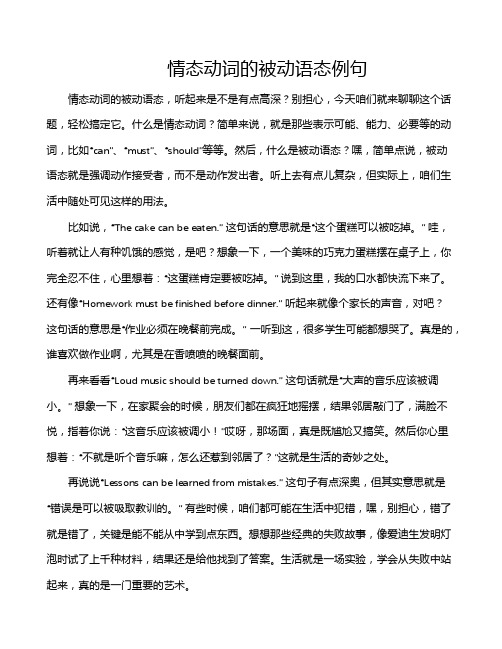
情态动词的被动语态例句情态动词的被动语态,听起来是不是有点高深?别担心,今天咱们就来聊聊这个话题,轻松搞定它。
什么是情态动词?简单来说,就是那些表示可能、能力、必要等的动词,比如“can”、“must”、“should”等等。
然后,什么是被动语态?嘿,简单点说,被动语态就是强调动作接受者,而不是动作发出者。
听上去有点儿复杂,但实际上,咱们生活中随处可见这样的用法。
比如说,“The cake can be eaten.” 这句话的意思就是“这个蛋糕可以被吃掉。
” 哇,听着就让人有种饥饿的感觉,是吧?想象一下,一个美味的巧克力蛋糕摆在桌子上,你完全忍不住,心里想着:“这蛋糕肯定要被吃掉。
” 说到这里,我的口水都快流下来了。
还有像“Homework must be finished before dinner.” 听起来就像个家长的声音,对吧?这句话的意思是“作业必须在晚餐前完成。
” 一听到这,很多学生可能都想哭了。
真是的,谁喜欢做作业啊,尤其是在香喷喷的晚餐面前。
再来看看“Loud music should be turned down.” 这句话就是“大声的音乐应该被调小。
” 想象一下,在家聚会的时候,朋友们都在疯狂地摇摆,结果邻居敲门了,满脸不悦,指着你说:“这音乐应该被调小!”哎呀,那场面,真是既尴尬又搞笑。
然后你心里想着:“不就是听个音乐嘛,怎么还惹到邻居了?”这就是生活的奇妙之处。
再说说“Lessons can be learned from mistakes.” 这句子有点深奥,但其实意思就是“错误是可以被吸取教训的。
” 有些时候,咱们都可能在生活中犯错,嘿,别担心,错了就是错了,关键是能不能从中学到点东西。
想想那些经典的失败故事,像爱迪生发明灯泡时试了上千种材料,结果还是给他找到了答案。
生活就是一场实验,学会从失败中站起来,真的是一门重要的艺术。
再来个轻松点的例子,“The dishes need to be washed.” 这句子你肯定听过吧,意思就是“碗碟需要被洗了。
高中语法解读情态动词和被动语态的区别
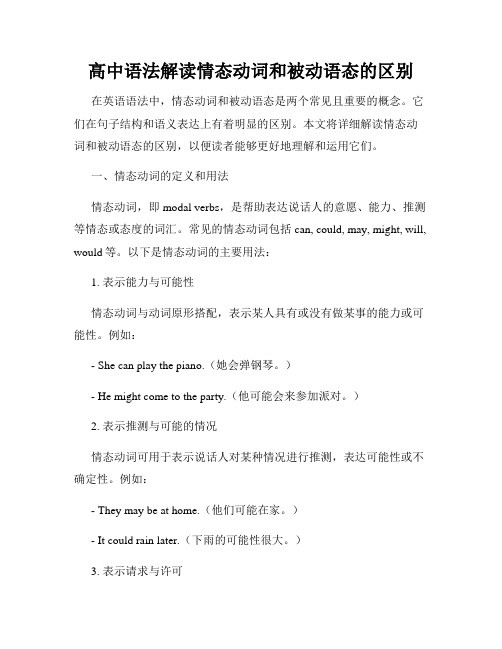
高中语法解读情态动词和被动语态的区别在英语语法中,情态动词和被动语态是两个常见且重要的概念。
它们在句子结构和语义表达上有着明显的区别。
本文将详细解读情态动词和被动语态的区别,以便读者能够更好地理解和运用它们。
一、情态动词的定义和用法情态动词,即modal verbs,是帮助表达说话人的意愿、能力、推测等情态或态度的词汇。
常见的情态动词包括can, could, may, might, will, would等。
以下是情态动词的主要用法:1. 表示能力与可能性情态动词与动词原形搭配,表示某人具有或没有做某事的能力或可能性。
例如:- She can play the piano.(她会弹钢琴。
)- He might come to the party.(他可能会来参加派对。
)2. 表示推测与可能的情况情态动词可用于表示说话人对某种情况进行推测,表达可能性或不确定性。
例如:- They may be at home.(他们可能在家。
)- It could rain later.(下雨的可能性很大。
)3. 表示请求与许可情态动词还可用于表示请求或许可。
例如:- Can you lend me your pen?(你能借我你的钢笔吗?)- May I use your phone?(我可以用一下你的手机吗?)二、被动语态的定义和用法被动语态,即passive voice,是表示主动语态中的动作接受者或受事者为句子的主语,而动作执行者为句子的宾语或省略。
被动语态的结构是由助动词be和动词的过去分词构成。
下面是被动语态的主要用法:1. 强调动作的接受者被动语态常用于强调动作的接受者而非执行者。
例如:- The book was written by Mark Twain.(这本书是马克·吐温写的。
)- The cake was made by my mom.(这个蛋糕是我妈妈做的。
)2. 避免指责或隐藏动作执行者被动语态可以用于避免指责或隐藏动作的执行者。
含有情态动词的被动语态

一、基本含义含有情态动词的被动语态用来说明某人或某物被动性动作所反映出的感情和态度。
二、基本结构含有情态动词的被动语态的基本结构为:情态动词 + be + 及物动词的过去分词。
例如:The computer must be repaired now. 这台电脑必须立刻修理。
Many trees should be planted on the mountains. 应该在山上种植许多树。
三、转变方法1. 将主动句的宾语变成被动句的主语;2. 把“情态动词 + 动词原形”变成“情态动词 + be + 及物动词的过去分词”。
例如:You should finish your homework at once. →Your homework should be finished (by you) at once.You can take this book home. →This book can be taken home (by you).四、句式变换含有情态动词的被动语态的疑问句、否定句的变化均需借助于情态动词来完成。
1. 一般疑问句。
直接将被动语态的陈述句中的情态动词提到句首。
例如:This work must be done right now.→Must this work be done right now?His homework should be finished before six.→Should his homework be finished before six?2. 特殊疑问句。
由疑问词加上含有情态动词的被动语态的一般疑问句构成。
例如:Where can the book be found? 这本书在什么地方能被找到呢?When must my homework be handed in? 我的作业必须什么时候交?3. 反意疑问句。
附加问句部分要用“情态动词 + 主语”。
被动语态与情态动词复习

目录
• 被动语态复习 • 情态动词复习 • 被动语态与情态动词的结合使用 • 练习与巩固
01
被动语态复习
被动语态的定义
被动语态是指句子中的主语是动作的接受者,而 01 不是动作的执行者。
被动语态强调动作的结果或状态,而不是动作的 02 执行者。
在被动语态中,主语通常出现在谓语之前。 03
情态动词在被动语态中的用法
"The book can be finished by you in two hours."
"You may be allowed to leave early."
"The report should be submitted by源自the deadline."
被动语态与情态动词的常见错误分析
情态动词可以单独使用,也可以与其他动词一起使用, 表达更丰富的含义。
情态动词的分类
情态动词可以分为两类:基本 情态动词和半助动词。
基本情态动词包括can、may、 must、should等,它们表示 可能性、必要性和意愿。
半助动词包括be able to、be going to、have to等,它们 表示能力、意图和必要性。
混淆了被动语态和主动语态,例如 "The book can finish by me in two hours." (正确应为 "The book can be finished by me in two hours.")
使用了不合适的情态动词,例如 "The book must be finished by you in two hours." (正 确应为 "The book should be finished by you in two hours.")
情态动词的被动语态

情态动词的被动语态情态动词是英语中常用的一类辅助动词,用于表示说话人的态度、情感或者提出建议、推测等等。
被动语态是英语中的一种语法结构,用于描述某个动作或者状态的受事者,而不是执行者。
本文将探讨情态动词的被动语态的用法和一些注意事项。
一. 情态动词的基本介绍情态动词包括can、could、may、might、shall、should、will、would、must等。
这些词在句子中起到辅助动词的作用,用来表示能力、可能性、推测、意愿等含义。
二. 情态动词的被动语态构成对于情态动词的被动语态构成,需要将情态动词后接的动词原形改为过去分词形式,并在情态动词后添加be动词的相应形式。
下面是几个例子:1. can的被动语态:can be + 过去分词- Active: He can repair the car.- Passive: The car can be repaired by him.2. may的被动语态:may be + 过去分词- Active: He may finish the work.- Passive: The work may be finished by him.3. must的被动语态:must be + 过去分词- Active: He must complete the task.- Passive: The task must be completed by him.三. 情态动词被动语态的用法情态动词的被动语态可以用来表示能力、可能性、推测和义务等。
下面是一些常见的用法:1. 表示能力:can、could的被动语态- The documents can be understood by everyone.- The problem could be solved by our team.2. 表示可能性:may、might的被动语态- The package may be delivered tomorrow.- The flight might be canceled due to bad weather.3. 表示推测:must的被动语态- The missing keys must be somewhere in the house.4. 表示要求、命令:should、must的被动语态- The report should be submitted by the end of the week.- The rules must be followed by all participants.四. 注意事项在使用情态动词的被动语态时,需要注意以下几点:1. 情态动词后接的动词应该使用过去分词形式。
含情态动词的被动语态结构例句

含情态动词的被动语态结构例句被动语态是英语语法中的一个重要部分,它用来表示主语是动作的接收者,而不是执行者。
而含情态动词的被动语态结构更是一种常见的语法结构,它能够更准确地表达说话者的情感和态度。
本文将为大家介绍含情态动词的被动语态结构,并提供一些例句以供参考。
一、什么是含情态动词的被动语态结构含情态动词的被动语态结构是指在被动语态中使用情态动词,以表达说话者的情感和态度。
情态动词包括can、could、may、might、must、shall、should、will、would等。
在使用含情态动词的被动语态结构时,需要注意动词的时态、语态和人称的变化。
二、含情态动词的被动语态结构的用法1. 表示可能性当含情态动词的被动语态结构中使用may、might、could等动词时,可以表示可能性。
例句:The package may be delivered tomorrow.这个包裹可能明天送到。
The meeting might be postponed due to bad weather.会议可能因为天气不好而延期。
2. 表示推测当含情态动词的被动语态结构中使用must、should等动词时,可以表示推测。
例句:The letter must have been lost in the mail.这封信一定是在邮递过程中丢失了。
The project should have been finished by now.这个项目现在应该已经完成了。
3. 表示义务和责任当含情态动词的被动语态结构中使用must、should等动词时,可以表示义务和责任。
例句:The report must be submitted by Friday.这份报告必须在周五之前提交。
The students should be given more opportunities to express their opinions.应该给学生更多表达意见的机会。
情态动词的被动语态用法(一)
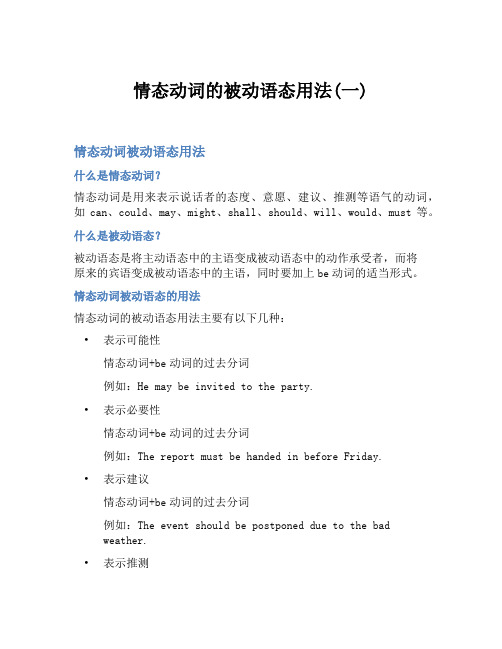
情态动词的被动语态用法(一)情态动词被动语态用法什么是情态动词?情态动词是用来表示说话者的态度、意愿、建议、推测等语气的动词,如can、could、may、might、shall、should、will、would、must等。
什么是被动语态?被动语态是将主动语态中的主语变成被动语态中的动作承受者,而将原来的宾语变成被动语态中的主语,同时要加上be动词的适当形式。
情态动词被动语态的用法情态动词的被动语态用法主要有以下几种:•表示可能性情态动词+be动词的过去分词例如:He may be invited to the party.•表示必要性情态动词+be动词的过去分词例如:The report must be handed in before Friday.•表示建议情态动词+be动词的过去分词例如:The event should be postponed due to the badweather.•表示推测情态动词+be动词的过去分词例如:The missing dog might be found in the park.注意事项•情态动词的被动语态中,主语通常是事物或抽象概念,而不是人。
•情态动词的被动语态用法在口语和书面语中都常用。
结语掌握情态动词的被动语态用法可以使我们的表达更加准确、规范。
在使用时,需要注意语态转换要符合语法规则,并且根据不同的语境选择合适的情态动词和被动语态形式。
•情态动词的被动语态中,通常不用于表示动作的时态,而是用来表达说话者的态度、意愿、建议、推测等。
•情态动词的被动语态中,be动词的形式要根据时态、人称和数的变化而发生变化,如be动词的一般现在时形式为am/is/are,一般过去时形式为was/were,现在完成时形式为have/has been,过去完成时形式为had been等。
•在情态动词的被动语态中,有时候需要使用by短语来表明动作的执行者,但并不是每个情况都需要加by短语。
被动语态情态动词结构
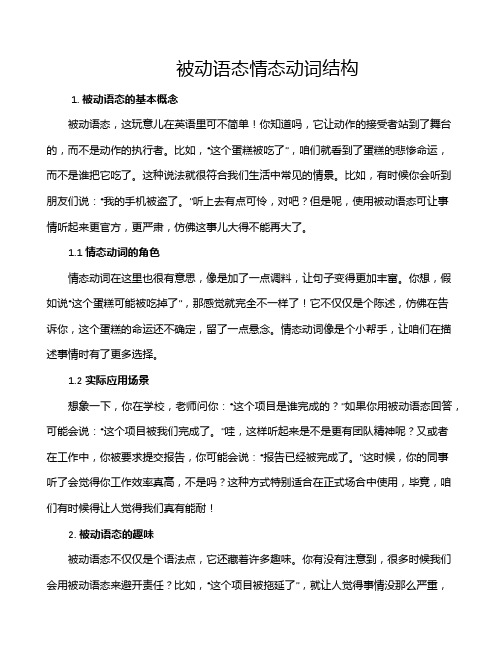
被动语态情态动词结构1. 被动语态的基本概念被动语态,这玩意儿在英语里可不简单!你知道吗,它让动作的接受者站到了舞台的,而不是动作的执行者。
比如,“这个蛋糕被吃了”,咱们就看到了蛋糕的悲惨命运,而不是谁把它吃了。
这种说法就很符合我们生活中常见的情景。
比如,有时候你会听到朋友们说:“我的手机被盗了。
”听上去有点可怜,对吧?但是呢,使用被动语态可让事情听起来更官方,更严肃,仿佛这事儿大得不能再大了。
1.1 情态动词的角色情态动词在这里也很有意思,像是加了一点调料,让句子变得更加丰富。
你想,假如说“这个蛋糕可能被吃掉了”,那感觉就完全不一样了!它不仅仅是个陈述,仿佛在告诉你,这个蛋糕的命运还不确定,留了一点悬念。
情态动词像是个小帮手,让咱们在描述事情时有了更多选择。
1.2 实际应用场景想象一下,你在学校,老师问你:“这个项目是谁完成的?”如果你用被动语态回答,可能会说:“这个项目被我们完成了。
”哇,这样听起来是不是更有团队精神呢?又或者在工作中,你被要求提交报告,你可能会说:“报告已经被完成了。
”这时候,你的同事听了会觉得你工作效率真高,不是吗?这种方式特别适合在正式场合中使用,毕竟,咱们有时候得让人觉得我们真有能耐!2. 被动语态的趣味被动语态不仅仅是个语法点,它还藏着许多趣味。
你有没有注意到,很多时候我们会用被动语态来避开责任?比如,“这个项目被拖延了”,就让人觉得事情没那么严重,也不指向特定的人。
这种情况下,大家都知道“谁”拖延了,但又好像没人愿意承认,真是个妙招!2.1 日常生活中的被动语态在日常生活中,被动语态的使用可谓是无处不在。
比如,你看到一杯水倒翻了,可能会听到有人说:“水被洒了。
”这时候,水洒的责任似乎不再重要,重要的是解决这个小麻烦。
再比如,有人被邀请去参加聚会,他可能会说:“我被邀请了。
”这话听上去就很高级,似乎他在社交界很有一席之地。
大家会想,这人真不错,连邀请都被他“收到了”。
情态动词的被动语态

情态动词的被动语态【概念】(1)情态动词的被动语态:含情态动词的被动语态说明某个被动性动作所反映出的感情和态度.初中阶段学习可用于被动语态的情态动词有can,may,must,need,should等,分别表示"能够被…;可以被…;必须被…;应该被…"等.(2)被动语态:被动语态(passive voice)是动词的一种形式,用以说明主语与谓语动词之间的关系.英语的语态共有两种:主动语态和被动语态.主动语态表示主语是动作的执行者,被动语态表示主语是动作的承受者.被动语态是动词的一种特殊形式,一般来说,只有需要动作对象的及物动词才有被动语态.汉语往往用"被"、"受"、"给"等被动词来表示被动意义.被动语态由"助动词be+及物动词的过去分词"构成.(3)及物动词:在英语中按动词后可否直接跟宾语,可以把动词分成两种:及物动词与不及物动词.字典里词后标有vt.的就是及物动词,字典里词后标有vi.的就是不及物动词.不及物动词后不能直接跟有动作的对象(即宾语),若要跟宾语,必须先在其后添加上某个介词,如to,of,at后方可跟上宾语.及物动词可直接跟宾语.【结构】含情态动词的被动语态结构形式:主语+情态动词+be+及物动词的过去分词.①主语+情态动词+be+(by+宾语),其中by意为"被…;由…",表动作的执行者.如:The library must be kept quiet by us.我们必须保持图书馆安静.②含情态动词的疑问句、否定句的变化均需借助于情态动词完成.如:Magazines can be taken out of the reading room.(肯定式)Magazines can't be taken out of the reading room.(否定式)Can magazines be taken out of the reading room?(疑问式)Yes,they can./No,they can't.。
常见的情态动词的被动语态怎么构成?
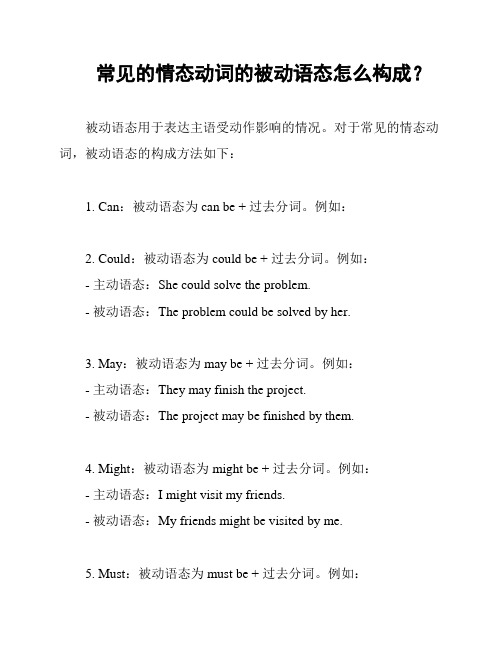
常见的情态动词的被动语态怎么构成?被动语态用于表达主语受动作影响的情况。
对于常见的情态动词,被动语态的构成方法如下:1. Can:被动语态为can be + 过去分词。
例如:2. Could:被动语态为could be + 过去分词。
例如:- 主动语态:She could solve the problem.- 被动语态:The problem could be solved by her.3. May:被动语态为may be + 过去分词。
例如:- 主动语态:They may finish the project.- 被动语态:The project may be finished by them.4. Might:被动语态为might be + 过去分词。
例如:- 主动语态:I might visit my friends.- 被动语态:My friends might be visited by me.5. Must:被动语态为must be + 过去分词。
例如:6. Should:被动语态为should be + 过去分词。
例如:- 主动语态:We should attend the meeting.- 被动语态:The meeting should be attended by us.7. Would:被动语态为would be + 过去分词。
例如:- 主动语态:She would buy a new car.- 被动语态:A new car would be bought by her.需要注意的是,有些情态动词的被动语态形式并不常用,因此在实际应用中需要根据上下文和常用惯进行选择。
以上是常见的情态动词的被动语态的构成方法。
希望对您有所帮助!。
[精]情态动词的被动语态与情态动词表“推测”或“判断”的用法
![[精]情态动词的被动语态与情态动词表“推测”或“判断”的用法](https://img.taocdn.com/s3/m/3b460a9d6c85ec3a86c2c50d.png)
情态动词的被动语态与情态动词表“推测”或“判断”的用法一、情态动词被动语态的用法〈一〉构成含有情态动词的被动语态的结构为“情态动词+助动词be+及物动词的过去分词”情态动词指can,may, must, should等。
The flowers should be watered.应该给花浇水了。
Tables can be made of stone.桌子可由石头做成。
Teenagers should be allowed to go out with their friends.应该允许青少年和朋友外出。
〈二〉句式肯定形式:主语+情态动词+be+及物动词的过去分词+by短语(by短语可省略。
否定形式:主语+情态动词+not+be+及物动词的过去分词。
一般疑问句:情态动词+主语+be+及物动词的过去分词?特殊疑问句:特殊疑问词+情态动词+主语+be+及物动词的过去分词?Waste paper should not be thrown here.废纸不应该被扔在这里。
Must the trees be watered now?这些树必须现在浇水吗?Should it be done by Li Ming?这件事应该是李明干吗?注意:如果不强调动作的执行者,by短语常可省略。
【典例分析】Teenagers should _______to go out with their friends.A. be allowedB. allowC. allowedD. to allow【答案】A考点:考查动词的语态。
二、情态动词表示“推测”或“判断”情态动词表示行为主体或说话者的感情和态度,一般无人称和数的变化。
它本身有一定含义,但并不完整,必须与其他动词一起构成谓语,才能表达相对完整的意义。
〈一〉对不同时态的推测情态动词可以表示说话人的语气。
本单元主要学习情态动词must,can/could,may/might表示推测的用法。
含情态动词的被动语态结构例句

含情态动词的被动语态结构例句语法中,情态动词是指用来表示说话人态度、意愿、能力等情感色彩的动词,如can、could、may、might、must、shall、should、will、would等,而被动语态则是指主语是动作的承受者,而不是动作的执行者的一种语法结构。
在英语中,含情态动词的被动语态结构也是一种常见的语法结构,本文将通过一些例句来详细介绍这种结构的用法和特点。
1. The work must be finished by Friday.这句话中,must表示说话人对完成工作的强烈要求,同时be finished是被动语态的形式,强调的是工作的完成过程,而不是完成者。
这种结构常用于强调时间限制和完成要求,通常被译为“必须在……之前完成”。
2. The book can be borrowed from the library.这句话中,can表示说话人允许或建议借书,同时be borrowed 是被动语态的形式,强调的是借书的行为,而不是借书者。
这种结构常用于表示允许或建议,通常被译为“可以从……借”。
3. The car should be repaired as soon as possible.这句话中,should表示说话人对车辆维修的建议或期望,同时be repaired是被动语态的形式,强调的是车辆的维修过程,而不是维修者。
这种结构常用于表示建议或期望,通常被译为“应该尽快修理”。
4. The letter may be delivered tomorrow.这句话中,may表示说话人对信件送达的可能性,同时be delivered是被动语态的形式,强调的是信件的送达过程,而不是送达者。
这种结构常用于表示可能性或预测,通常被译为“可能明天送达”。
5. The project will have to be reevaluated.这句话中,will表示说话人对项目重新评估的必要性,同时be reevaluated是被动语态的形式,强调的是项目的重新评估过程,而不是评估者。
情态动词的被动语态结构
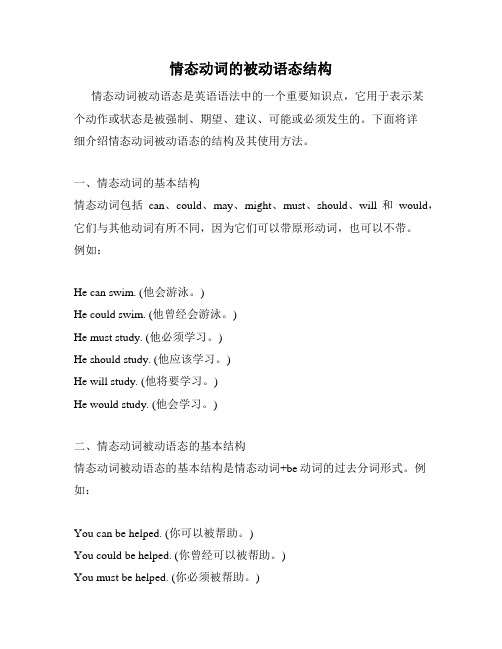
情态动词的被动语态结构情态动词被动语态是英语语法中的一个重要知识点,它用于表示某个动作或状态是被强制、期望、建议、可能或必须发生的。
下面将详细介绍情态动词被动语态的结构及其使用方法。
一、情态动词的基本结构情态动词包括can、could、may、might、must、should、will和would,它们与其他动词有所不同,因为它们可以带原形动词,也可以不带。
例如:He can swim. (他会游泳。
)He could swim. (他曾经会游泳。
)He must study. (他必须学习。
)He should study. (他应该学习。
)He will study. (他将要学习。
)He would study. (他会学习。
)二、情态动词被动语态的基本结构情态动词被动语态的基本结构是情态动词+be动词的过去分词形式。
例如:You can be helped. (你可以被帮助。
)You could be helped. (你曾经可以被帮助。
)You must be helped. (你必须被帮助。
)You should be helped. (你应该被帮助。
)You will be helped. (你将被帮助。
)You would be helped. (你会被帮助。
)三、情态动词被动语态的用法1. 表示被动使用情态动词被动语态时,经常用于表示某个动作或状态是被强制、期望、建议、可能或必须发生的。
例如:The work can be done. (这项工作可以完成。
)The work must be done. (这项工作必须完成。
)The work should be done. (这项工作应该完成。
)2. 表示推测情态动词被动语态还可以用来表示推测,这种情况下通常使用should 或might。
例如:The animal should be rescued. (这只动物应该被拯救。
情态动词被动语态结构
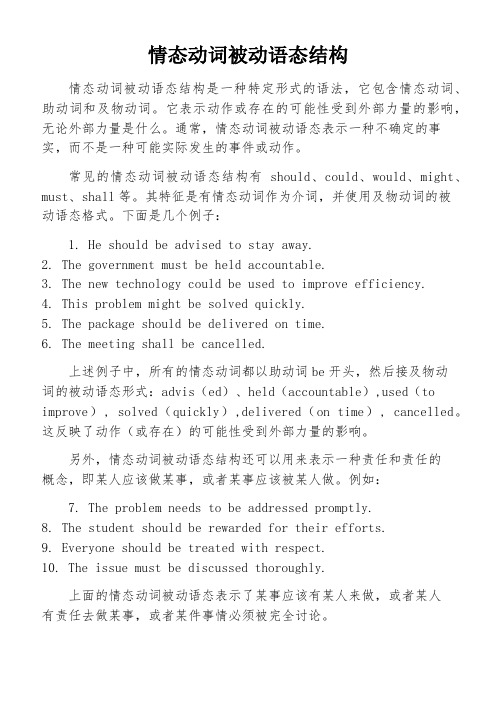
情态动词被动语态结构情态动词被动语态结构是一种特定形式的语法,它包含情态动词、助动词和及物动词。
它表示动作或存在的可能性受到外部力量的影响,无论外部力量是什么。
通常,情态动词被动语态表示一种不确定的事实,而不是一种可能实际发生的事件或动作。
常见的情态动词被动语态结构有 should、could、would、might、must、shall等。
其特征是有情态动词作为介词,并使用及物动词的被动语态格式。
下面是几个例子:1. He should be advised to stay away.2. The government must be held accountable.3. The new technology could be used to improve efficiency.4. This problem might be solved quickly.5. The package should be delivered on time.6. The meeting shall be cancelled.上述例子中,所有的情态动词都以助动词be开头,然后接及物动词的被动语态形式:advis(ed)、held(accountable),used(to improve), solved(quickly),delivered(on time), cancelled。
这反映了动作(或存在)的可能性受到外部力量的影响。
另外,情态动词被动语态结构还可以用来表示一种责任和责任的概念,即某人应该做某事,或者某事应该被某人做。
例如:7. The problem needs to be addressed promptly.8. The student should be rewarded for their efforts.9. Everyone should be treated with respect.10. The issue must be discussed thoroughly.上面的情态动词被动语态表示了某事应该有某人来做,或者某人有责任去做某事,或者某件事情必须被完全讨论。
- 1、下载文档前请自行甄别文档内容的完整性,平台不提供额外的编辑、内容补充、找答案等附加服务。
- 2、"仅部分预览"的文档,不可在线预览部分如存在完整性等问题,可反馈申请退款(可完整预览的文档不适用该条件!)。
- 3、如文档侵犯您的权益,请联系客服反馈,我们会尽快为您处理(人工客服工作时间:9:00-18:30)。
高中英语情态动词的用法一.can和could情态动词用法例句can/could 表示能力1.“I don’t think Mike can type.”“Yes, he can.”2.I can speak fluent English now , but I couldn’t last year. 在肯定句中,表示客观可能性,并不涉及具体某事会发生,常用来说明人或事物的特征(译为“有时会”)。
要表达具体某事实际发生的可能性时,不用can,需用could,may,might。
1.As a human being, anyone can make a mistake.2.I’m confident that a solution can be found.3.He can be very forgetful sometimes.4.I may stay at home this weekend.(实际可能性)5.Peter might come to join us.(实际可能性)6.It will be sunny in the daytime ,but it could raintonight.(实际可能性)表示请求和允许。
表示请求,口语中常用could代替can,使语气更委婉。
1.Can we turn the air conditioner on?2.Any police officer can insist on seeing a driver’s license.3.In soccer, you can’t touch the ball with your hands.4.Could you have her call me back when she gets home,please?5.I wonder if I could just ask you to sign this.表示对现在的动作或状态进行主观的猜测,主要用在否定句和疑问句中。
1.It can’t be easy caring for a man and a child who are notyour own.2.Can the man over there be our head master?表示惊异、怀疑、不相信等态度,主要用在否定句、疑问句和感叹句中。
1.Can this be an excuse for not giving them help? 2.This can’t be true.3.How can you be so crazy.特别说明:(1)could用来表示请求时,语气委婉,主要用于疑问句,不能用于肯定句,答语应用can(即:could不能用于现在时态的简略答语中)。
如:——Could I use your dictionary?——Yes, you can.(否定回答可用:No, I’m afraid not.或者是you can’t)表示推测时,could不是过去式,只是语气更委婉;若是推测已发生的事或过去的情况,用can/could have done (2)can和be able to辨析can(could)和be able to都可以表示能力,意思上没有区别。
但can只有现在式和过去式,而be able to则有更多的形式。
如:I’ve always wanted to able to speak fluent English.Those bags look really heavy, are you sure you’ll be able to carry them on your own?但是,表示在过去某时的某一场合经过一番努力,终于做成了某事,通常不用could,而用was/were able to 来表示。
这时,was/were able to相当于managed to do或succeed in doing。
如:After the accident it was a long time before she was able to walk again.The fire was very big, but most people were able to escape from the building.(3) 惯用形式“cannot …too…”表示“无论怎么……也不(过分)”。
如:You cannot be too careful.你越小心越好。
惯用形式“cannot but+ 不定式(不带to)”表示“不得不,只好”。
如:I cannot but admire her determination.我不得不钦佩你的决心。
二.may和might情态动词用法例句may/might 表示允许、许可。
否定回答一般用mustnot/mustn’t,表示“禁止、阻止”之意,但也可以用had better not (最好别)或may not(不可以),语气较为委婉。
1.May I come in and wait?2.——May I smoke here?——No, you mustn’t(或No, you’d better not.)在表示请求、允许时,might比may语气更委婉些。
用May I征询对方许可在文体上比较正式,在口气上比较客气,在日常用语中,用Can I征询对方意见更为常见。
1.Might I borrow your pen?2.I wonder if I might speak to your son.表示可能性的推测,通常用在肯定句和否定句中,含有“或许”“大概”“可能”之意;用might代替may时,则语气显得更加不肯定。
1.It may rain this afternoon.2.She might come to join us this afternoon.3.I suppose he might have missed the train.may用于祈使句表示祝愿1.May you succeed.2.May you live happily!3.May she rest in peace.愿她安息。
惯用句式:“may as well或might(just)as well+动词原形”意为“最好,满可以,倒不如”,相当于“had better或there is no reason to do anything else.1.There is nothing to do, so I may as well go tobed.2.You may as well tell us now, we’ll find out sooneror later.3.I suppose we might as well go home.4.And if you have to plough the field anyway, youmight as well plant it at the same time. 二.must和have to情态动词用法例句must 表示“必须,应该”之意,语气比should,ought to强烈。
其否定形式mustn’t表示“不准,不应该,禁止”等意1.You must come to school on time.2.Everybody must obey the law.3.You mustn’t drive so fast in the street.4.We mustn’t waste any more time.在回答带有must的问句时,否定回答常用needn’t或don’t have to,表示“不必”,而不用mustn’t1.—Must I come back before ten?—Yes,you must.----No, you needn’t(No, you don’t have to) 表示有把握的推测,意为“一定、准是、相必”,只用于肯定句中1.It must be my mother.2.You must be hungry after a walk.3.There must be a hole in the wall.have to “必须,不得不”,意义与must相近。
但must表示的是说话人的主观看法,而have to则往往强调客观需要。
1.The film is not interesting. I really must go now. 2.I have to go now, because my mother is in hospital.must只有一种形式,即现在式与过去式都是一种形式,而have to则涉及各种人称、时态等方面的变化形式。
1.I had to work hard when I was your age.2.I will have to learn how to use a computer. 3.In order to take the exam, we’ll have to finish the whole book by the end of this month .两者的否定意义不同,mustn’t表示“禁止,不许”,1.You mustn’t go there.don’t have to表示不必。
2.You don’t have to go there. 注意:表示”偏要,硬要做某事-how old are you, madam?-if you must know, I’m twice my son’s age(如果你非得知道,是我儿子年龄的两倍)四.shall和should情态动词用法例句shall 用于第一、三人称构成的疑问句,表示征求对方意见或请求指示,其意为“要不要”、“…好吗”:1.Shall I open the window? 2.Shall we say 6 o’clock, then? 3.Shall he come to see you?1 用于第二、三人称陈述句中,表示说话人给对方的命令、警告、允诺、威胁、命令、规定、必然性等2表示强制,用于法令、条约、规章中,意为“必须,应该”。
1.Don’t worry, you shall get the answer this afternoon.(允诺)2.He shall be sorry for it one day, I tell you. (警告)3.You shall do as I say. (命令)4.If you children don’t do as I tell you, you shall not go to the party. (威胁)5.The Persons under 18 shall not be employed in night work.不满十八岁的人不得雇佣干夜间工作。
